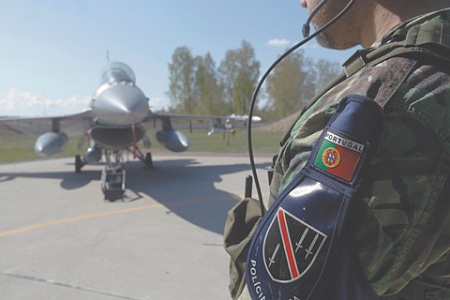
Portugal, a nation that has long lagged behind its NATO allies in defense spending, has announced a dramatic policy reversal, signaling a large-scale rearmament of its military. Foreign Minister Paulo Rangel declared that the country will fast-track its defense expenditure to meet the alliance’s benchmark of 2% of GDP this year, a target originally slated for 2029. This move marks a significant departure for a country traditionally seen as one of Europe’s more peaceful nations and reflects a broader trend of militarization across the continent.
To meet this ambitious goal, Lisbon is preparing for major purchases of military equipment from the United States and European partners, including new aircraft and naval vessels. While Minister Rangel refrained from disclosing specific details about the procurements, it has been previously reported that Portugal is seeking to replace its aging fleet of American-made F-16 fighter jets. This overhaul represents the most substantial effort to modernize the Portuguese armed forces in decades.
For years, Portugal ranked near the bottom of NATO members in terms of defense investment, with its 2024 spending at approximately 1.55% of GDP. In comparison, European economic powers like France and Germany have committed vastly larger sums to their defense sectors. The shift in Lisbon’s policy underscores a continent-wide consensus on the necessity of bolstering defense capabilities in response to the altered geopolitical security landscape. “We definitely want to invest in European defense,” Rangel affirmed, also noting the parallel growth of Portugal’s domestic defense industry, particularly in drone technology.
The decision is also deeply connected to Portugal’s firm stance in support of Ukraine. Rangel reiterated the West’s commitment to its strategy against the Kremlin and hinted at the development of new sanctions to increase pressure on Moscow. Portugal has already been an active contributor to Ukraine’s defense, providing a range of support including ammunition, medical equipment, drones, and military vehicles.
While the primary purpose of the new military hardware is to modernize Portugal’s own forces, questions remain about its potential future use in supporting Kyiv. To date, Lisbon has not supplied combat aircraft to Ukraine. However, as a member of the “coalition of the willing”—countries prepared to send troops for post-conflict roles in Ukraine—the newly acquired assets could play a role in a future European security architecture. Whether these new jets will remain in Portuguese hangars or eventually contribute to Ukraine’s defense remains a critical, unanswered question.
